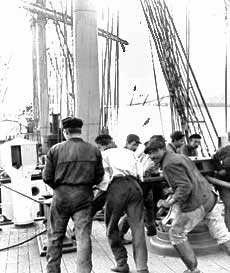Instinct VS Construct , Shannon Boyle
Shannon Boyle
April 16, 2007
Working the Waters
Instinct VS Construct
In Billy Budd, Sailor, Herman Melville explores the idea of human instinct opposing human construct through capital punishment. Through the story of the protagonist, Billy Budd, the reader is left to decide for themselves if what happened to Billy was just or not. Melville uses the innocence and good nature of Billy to contrast the seemly evil personality of John Claggart, the master-at-arms. The reader is able to identify with both characters, because of certain inherit qualities found in all humans. It is these primal instincts found in the characters that make it so hard to side with one of the other.
Everybody has a good side, and that is that Billy Budd embodies. He is good looking, well natured, and completely oblivious to the fact that he possesses such great qualities. He seemed to believe that Claggart, could not dislike him, because he had done nothing wrong, his “innocence was his blinder (67).” Perhaps it was this naïve behavior that bugged Claggart so much, or perhaps it was simply his good looks. What ever it was, Melville leaves it up to the reader to decide. What is certain is that Claggart did not like Billy, and welcomed any situation in which he could show his distain for Billy but mask behind some other emotion. We all know what it is to be envious, and as Melville says, “did anybody seriously confess to envy? Something there is in it universally felt to be more shameful than even a felonious crime (51).” Perhaps, it he felt shameful for harboring such feeling towards Billy and that is what lead him to plea mutiny.
It is not until Billy is confronted by Captain Vere and Claggart, that Claggart’s distain is truly shown. In this scene, Billy’s boy like qualities is his downfall. As he is being yelled at he loses his speech and fatally hits Claggart. This made me think of what Cynthia refers to as the “reptile” portion of your rain. Billy felt threatened, and reacted from that section of his brain. This leaves Captain Vere with the challenge of punishing Billy. This is where the reader is forced to look at the moral dilemma presented. On one hand, Billy is a good person (with no mutiny on his mind), on the other hand, he has killed a man of higher rank than him. “The essential right and wrong involved in the matter, the clearer that might be, so much worse for the responsibility o the loyal sea commander, inasmuch as he was not authorized to determine the matter of that primitive basis (87).” Billy would have been let go if the men were not forced to punish him by law.
All of us can identify with these two characters. We know what it is to be liked, and we all know what it is to feel threatened. Melville seems to know this and exploits these qualities to set up a moral dilemma for the readers to consider. To me, one of the main themes of the story is weather our human nature, goes against our laws, what we have created for ourselves to keep order in society.
................................................................................................................................................
Okay, so I just re-read this and realized I have two papers going on here, the body is knot supporting my intro at all! But it is what I have so try to work with it ☺ I like what I have going with my intro so if you could look at that and tell me what you think that would be great, Shannon

